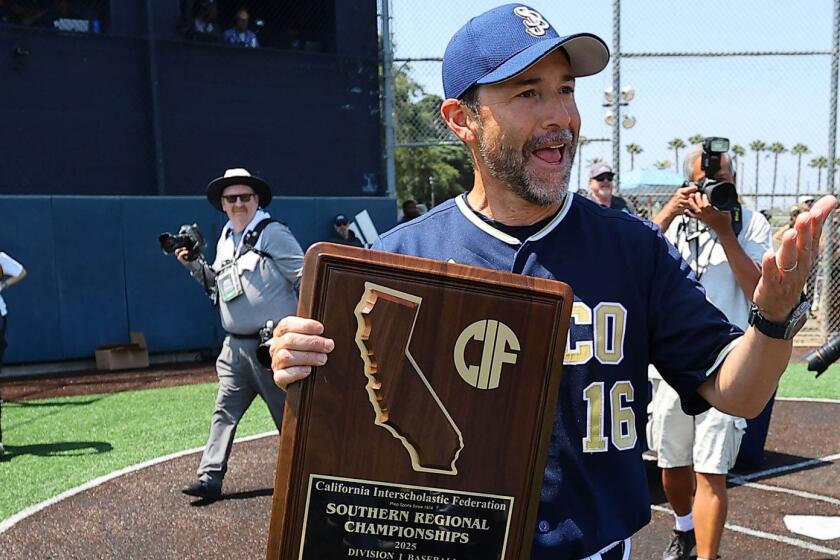Football Player Starts Over After Arrest
- Share via
Neither injury, illness nor poor grades were responsible for all-league receiver Barry Johnson of Los Angeles Fairfax sitting out the 2004 high school football season.
What kept him from practicing or even attending a game was a charge of rape.
He spent 65 days in a juvenile detention facility, then two months under house arrest, wearing an electronic bracelet attached to his ankle, waiting for the truth to come out.
“I prayed every night to God,” he said. “I talked to my mom, my dad, my cousins, anybody I could talk to who was a positive person.”
On Dec. 22, Johnson and two of his Fairfax teammates were finally set free. The charge facing them -- forcible rape in concert -- was dismissed by a juvenile court referee who concluded that the 15-year-old accuser “wasn’t a credible witness,” said Jane Robison, a spokeswoman for the district attorney’s office.
“The victim changed her story on the stand numerous times,” Robison said.
Johnson had never been in trouble with the law. He’s a 17-year-old junior who, his mother said, “would give you his shirt off his back” to anyone in need.
But on the afternoon of Aug. 2, he and two teammates made a terrible error in judgment. They went into a restroom on campus and had sex with a female student. They insisted the encounter was consensual. But the next day, the girl called police and alleged she had been raped.
On Aug. 10, police arrested two of the teenagers. When Johnson heard his friends were in custody, he turned himself in.
“I wasn’t going to let my friends go in when I was a part of it,” he said. “I was trying to set things straight.”
Johnson thought he’d spend a couple weeks in a detention facility while authorities investigated. Instead, he was locked up at Eastlake Juvenile Hall in Los Angeles until Oct. 15.
“I was thinking, ‘Am I going to be here forever?’ ” he said. “It was a shock.”
Released while awaiting trial, he was restricted to his house except for attending a continuation school. He couldn’t go to Fairfax football games or have friends come to visit.
“It just killed me,” his mother, Bashonia Smith, said. “He felt a big part of his life had been taken from him.”
The trial took place last month. The boys could have been sent to the California Youth Authority until age 25 had they been convicted. The prosecution presented its case over three days, then the juvenile referee, Maria Escobedo, dismissed the charges.
“I felt relief,” Johnson said. “I felt like a regular kid again.”
In her closing remarks, Escobedo said she “deplored the conduct” of Johnson and the two other football players for “having sex in the school bathroom.”
Johnson said he started to cry. He thought Escobedo was saying, “You guys did it but there was no evidence.”
“I felt she was putting a criminal label on people who are innocent,” he said.
Later, Johnson figured out the message Escobedo was trying to send.
“What she meant is we shouldn’t have made the decision to have sex,” he said. “I agree with her.”
Freedom has enabled Johnson to start over. It’s a second chance to resume his athletic career. He hopes to return to Fairfax to run track this spring and play his senior football season in the fall, but he must receive approval at a pending expulsion hearing.
He knows he has been through an ordeal he never imagined possible.
“It seemed like a movie to me,” he said.
Despite the damage he suffered, Johnson said, “This whole situation, even though I was falsely accused, it made me a better person.”
Among the lessons he said he has learned are “think before I make a decision” and “don’t join the crowd.”
Johnson said he has one lingering concern: the slowness and uncertainty of the justice system.
“It’s creepy,” he said. “Do you know how they say you’re innocent until proven guilty?
“I think it’s guilty until proven innocent.”
Eric Sondheimer can be reached at eric.sondheimer@latimes.com.
More to Read
Get our high school sports newsletter
Prep Rally is devoted to the SoCal high school sports experience, bringing you scores, stories and a behind-the-scenes look at what makes prep sports so popular.
You may occasionally receive promotional content from the Los Angeles Times.







